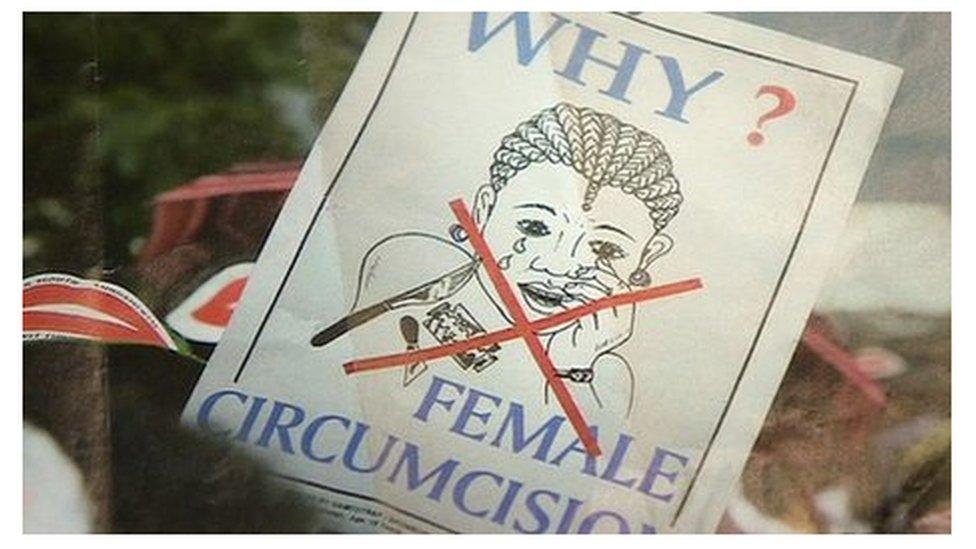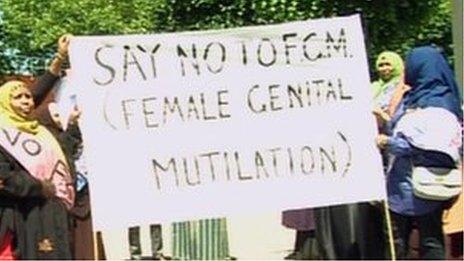No orders made to protect Welsh girls at risk of FGM
- Published

No orders to protect young girls and women at risk of female genital mutilation have been made in Wales, new figures have shown.
FGM protection orders (FGMPO), external ban those at risk of the practice from being taken outside the UK.
While 77 of the orders were granted by courts in England between July 2015 and June 2016, not one was imposed in Wales.
The NSPCC, who obtained the data, said FGM had "no place in any society".
Charity Welsh Women's Aid added: "The lack of prosecutions and FGM protection orders in Wales highlights that, despite legislation, there is still a need for a stronger commitment to changing attitudes as well as a commitment to support provision of specialist services for girls and women affected by FGM."
It called for national and local support for community-based interventions to "challenge attitudes and identify girls at risk", and for professionals, such as school staff and health visitors, to be specially trained.
It has been illegal to carry out FGM in the UK since 1985, which is done for cultural and religious reasons in certain communities.
Introduced in July 2015, anyone can apply for an FGMPO, which can allow a court to confiscate passports and travel documents to stop a girl being taken abroad.
Breaching the order is a criminal offence, with a maximum prison term of five years.

Some 1,500 calls about FGM have been made to the NSPCC since June 2013 about the practice - an average of one a day
Figures obtained through a Freedom of Information (FOI) request by the NSPCC show no orders have been issued by courts in Wales or Northern Ireland.
Of the 77 applications granted in England, 15 were made by police forces, 13 by a solicitor, friend or guardian, 11 by the person wanting to be protected and eight by family members.
The rest were made by other third parties.
Gwent Police said it had not applied for any as the safeguarding measures put into place by police and partners "have meant that the protection orders were not required".
North Wales Police said an application is usually made by the individual concerned or a "relevant third party" and not police.
The Dyfed-Powys force said it had not applied for any of the orders, South Wales Police was also asked to comment.
John Cameron, Head of NSPCC Helplines, said FGM was "child abuse" and against the law.
He said: "Some families who subject their children to female genital mutilation may do so because of cultural norms or that they believe it will help their child improve their life.
'Horrific act'
"It's vital that everyone realises FGM serves no purpose, and leaves long-lasting physical and emotional scars on the victims.
"For far too long female genital cutting has been cloaked in secrecy so we need more people in communities to join forces to ensure this dangerous practice is ended. "
A Home Office spokeswoman said the UK government was taking world-leading action.
"FGM is a horrific act of violence that no woman or girl should ever have to suffer," she said.
"We have significantly strengthened the law on FGM, including introducing a new offence of failing to protect a girl from FGM, extending the reach of extra territorial offences, and creating civil FGM Protection Orders to ensure we are able to protect women and girls at the earliest opportunity.
"We are carrying out an ongoing programme of outreach work to raise awareness of FGM and the available legal measures to tackle the issue, such as FGM Protection Orders. This includes engaging with the police and community organisations in Wales."
FGM, sometimes called female circumcision, refers to procedures including the partial or total removal of external female genital organs for non-medical reasons.
- Published6 February 2017

- Published6 February 2017

- Published27 July 2015

- Published6 February 2014
